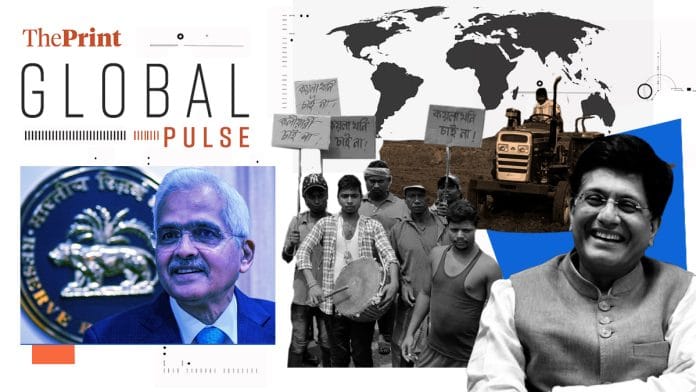New Delhi: India has come a long way from depending on food aid to becoming a net exporter of what people eat, reports The Economist in ‘The world’s next food superpower’.
The report gauges the progress of the Indian agriculture sector from the “ship-to-mouth” days of the 1950s and 1960s to producing high-grade coffee sold in European markets but also highlights the issue that India has a third more land under cultivation than China but harvests only a third as much produce by value. The report also points out that agriculture employs nearly half of all Indian workers but contributes only 15% of output and 12% of exports, adding that the employment figures mask a “huge underemployment” problem.
It blames these conditions on the government viewing agriculture as a “conduit for welfare”, not as an “engine of growth”, as well as policies such as demonetisation and an attempt to impose farm laws, which did not go down well with farmers. The report hopes the Shivraj Singh Chouhan-led agriculture ministry will fare better and suggests tackling patchy irrigation and encouraging higher-value processing while advising against regulation of food prices.
In its Big Story, Nikkei Asia reports that heat waves in India have dried up dams and impacted hydroelectricity generation, with the government now expanding coal production to meet energy needs despite Modi’s “lofty” climate promises at international climate conferences. However, contributors Priyanka Shankar and Valeria Mongelli write that Adivasis, with their bows and arrows, and activists are still attempting to preserve their land, forests and environment from coal mining projects.
The report, ‘India’s climate crisis: New coal mining spreads as heat waves drain hydro dams’, focuses on the Deocha-Pachami coal mine project in West Bengal’s Birbhum. While a schoolteacher from Bengal raises concerns about coal dust in the Asansol-Raniganj coal belt, an Adivasi man tells Nikkei Asia, “This is also the land of our ancestors and as Adivasis, we will continue fighting for our land and protect our trees and nature around us till we die.”
Benjamin Parkin’s Financial Times report, India warns UK not to impose deadline on trade talks, discusses the India-UK free trade agreement, first proposed in 2022. Though the new Keir Starmer government has expressed willingness for a deal that works for both countries, India has warned against any rush, says Parkin.
The report quotes Commerce Minister Piyush Goyal reiterating India’s ask for “greater openness”, as New Delhi looks for market access for goods such as textiles and better work and study terms for citizens in the UK. “We never discuss any FTA with any country or group of countries with a gun [to] our head,” he is quoted as saying.
In ‘India’s RBI governor says it’s too early for rate cuts’, Bloomberg reports on RBI Governor Shaktikanta Das’s latest TV interview. Das has said it’s too early for any interest rate cuts since inflation is still above target, correspondents Preeti Soni and Malavika Kaur Makol report. They write that Das stuck to this despite two of the RBI’s six members on the monetary policy committee voting last month to cut interest rates, arguing a tighter policy may slow down growth. He has also expressed confidence that RBI has “multiple instruments” to deal with capital inflows and said that the RBI’s full-year growth projection of 7.2% seems achievable.
UP Police, as an intimidation tactic, has charged journalists for commenting on the killing of Firoz Qureshi in Shamli district, Al Jazeera reports in Police in India book journalists after posts on alleged Muslim lynching. The report quotes journalists and watchdog organisations saying that the charges brought for what the police have called causing “hatred and anger” are biased as no FIRs have been registered against Hindu journalists commenting on the matter. Media watchdogs have called this a “grave outreach” by the state police, Al Jazeera reports.
The report highlights, “Cases of mob lynching of Muslims by Hindu groups and mobs, mainly under the pretext of protecting cows, an animal considered holy by a large section of Hindus, spiked after Prime Minister Narendra Modi’s Hindu nationalist Bharatiya Janata Party (BJP) came to power in 2014. Dozens have been killed in such attacks.”
US-South Korea pact, Australian soldier charged with spying
Weeks after the North Korea-Russia defence pact, the US and South Korea signed ‘U.S.-ROK Guidelines for Nuclear Deterrence and Nuclear Operations on the Korean Peninsula’ Thursday on the sidelines of the NATO summit. To know more, read the Associated Press report.
Australia has charged a soldier of the Australian Defence Force and her husband for spying for Russia — the first time that the country has used its foreign interference laws to bring espionage charges. To know more, read the BBC’s report.
(Edited by Madhurita Goswami)






